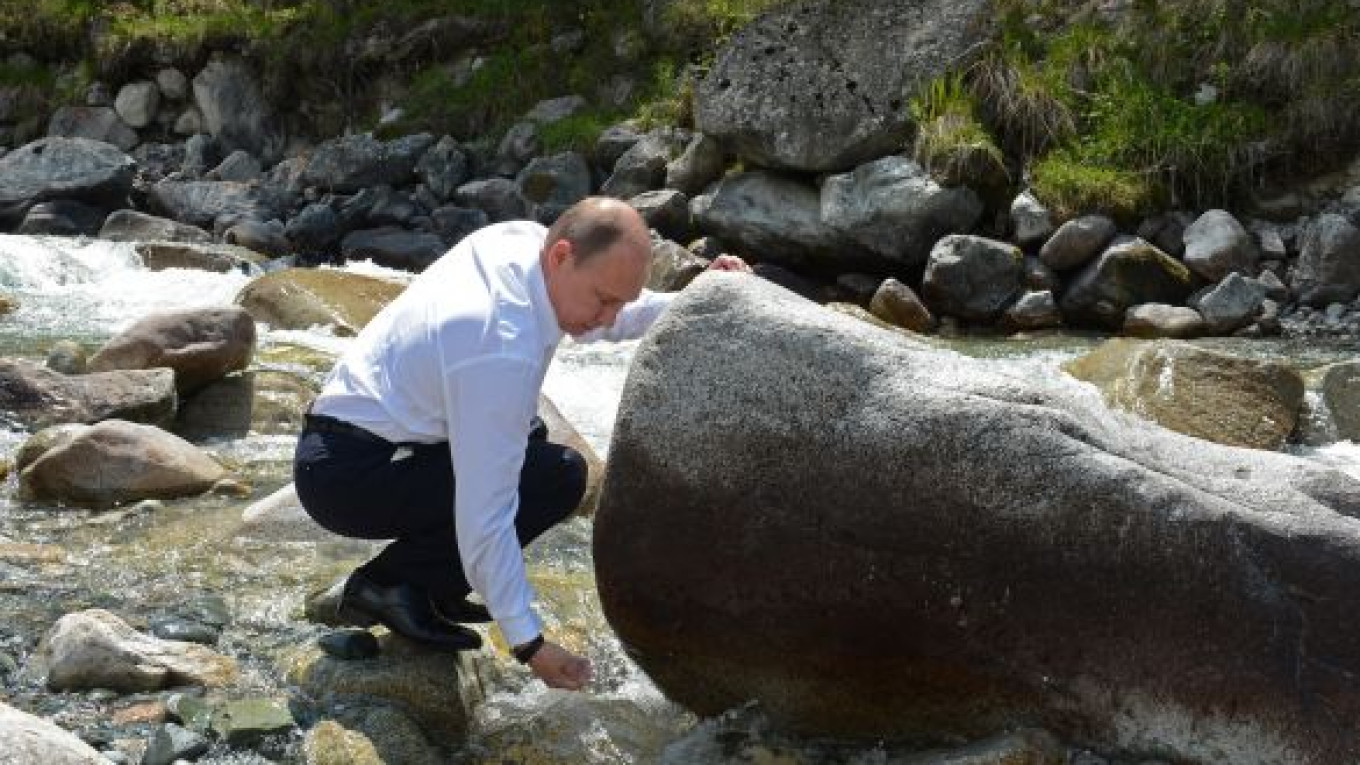Ahead of NATO's planned withdrawal from Afghanistan next year, leaders of the Russia-led Collective Security Treaty Organization have pledged to pool their resources to counter any potential deterioration of the security situation in the region.
In an effort to demonstrate the importance of the military alliance, President Vladimir Putin attended an informal CSTO summit in Bishkek on Tuesday with other heads of member countries. While in the Kyrgyz capital, Putin also held bilateral meetings with the presidents of Kyrgyzstan and Tajikistan.
Security in Afghanistan was at the top of the summit's agenda, with Putin expressing his hope that "we will confer about the developments in Afghanistan and the steps we must take to respond to any changes in the situation there and ensure the security of our nations."
Following the meeting, CSTO Secretary General Nikolai Bordyuzha said at a press conference that "concrete decisions have been taken, including military ones, to help the Afghan government ensure stability in their state."
"The issue of strengthening border control and supplying the [CSTO's] Collective Rapid Reaction Force with modern military equipment, as well as cooperation of relevant services in countering extremism, were discussed in particular," Bordyuzha said.
The CSTO was founded in 2002 in an effort to create an autonomous security space in the post-Soviet region, with all of its members abstaining from joining other military alliances and hosting third-country military bases until approval by all other member states. The group's current members are Armenia, Belarus, Kazakhstan, Kyrgyzstan, Russia and Tajikistan.
But the organization's role and usefulness have been in question since its founding. Since Uzbekistan withdrew from the group in July of last year, its future has become even more uncertain.
"Uzbekistan made a pragmatic decision, recognizing that the CSTO is just a tool for Russia to pursue its own interests," said Alexei Malashenko, scholar-in-residence at the Carnegie Moscow Center.
Early next month, the former member state will see the opening of a NATO liaison office in the Uzbek capital Tashkent, the Ferghana news agency reported.
Uzbekistan's withdrawal is not the only reason observers have cast doubt on whether the CSTO intends to fulfill its declared goals.
When riots broke out in Kyrgyzstan in 2010, CSTO troops were called on to quell the violence but no troops came, with Secretary General Bordyuzha calling the disturbance an "internal matter" for Kyrgyzstan.
Belarussian President Alexander Lukashenko was outraged at that reaction. "What sort of organization is this, if there is bloodshed in one of our member states and an unconstitutional coup d'etat takes place and this body keeps silent?" he said at the time.
The organization's troops have never been involved in any real military action. They hold training exercises annually.
"The CSTO is a kind of mythical outfit that increasingly resembles the CIS," Malashenko said. "One of their leaders once told me that CSTO top brass can only dream of the Taliban making an incursion into Central Asia," because it would allow the group to prove itself, he said.
But Alexei Makhlai, president of the Public Political Studies Center, is less skeptical of the organization.
"The events in Afghanistan will not develop along a positive scenario, and Russia is getting ready for this by trying to pool regional resources via the CSTO," he said.
Putin was greeted Tuesday by the summit's host, Kyrgyz President Almazbek Atambayev, at the latter's residence at Ala Archa National Park, located 40 kilometers south of Bishkek in the Tian Shan Mountains. The leaders took a walk along a river valley that Putin appeared to enjoy, pausing at one point to take a drink from a mountain spring.
Later in the day, Putin met with Tajik President Emomalii Rakhmon, whose country hosts Russia's 201st motor rifle division. The division's lease agreement was often used by Tajikistan as a bargaining chip in negotiations with Russia. In October, Putin and Rakhmon signed a new lease agreement, which has yet to be ratified by the Tajik parliament.
Two CSTO leaders, Lukashenko and Armenian President Serzh Sargsyan, skipped the summit. Lukashenko has been on bad terms with the Kyrgyz leadership due to his decision to grant Belarussian citizenship to Kurmanbek Bakiyev, who was ousted from the Kyrgyz presidency in April 2010 amid bloody riots in Bishkek.
Sargsyan did not attend due to Republic Day celebrations in Armenia.
On Wednesday, Putin is scheduled to go to Kazakhstan's capital, Astana, to participate in a meeting of the Supreme Eurasian Economic Council, which is part of another Russia-led regional integration project.
Contact the author at [email protected]
A Message from The Moscow Times:
Dear readers,
We are facing unprecedented challenges. Russia's Prosecutor General's Office has designated The Moscow Times as an "undesirable" organization, criminalizing our work and putting our staff at risk of prosecution. This follows our earlier unjust labeling as a "foreign agent."
These actions are direct attempts to silence independent journalism in Russia. The authorities claim our work "discredits the decisions of the Russian leadership." We see things differently: we strive to provide accurate, unbiased reporting on Russia.
We, the journalists of The Moscow Times, refuse to be silenced. But to continue our work, we need your help.
Your support, no matter how small, makes a world of difference. If you can, please support us monthly starting from just $2. It's quick to set up, and every contribution makes a significant impact.
By supporting The Moscow Times, you're defending open, independent journalism in the face of repression. Thank you for standing with us.
Remind me later.


